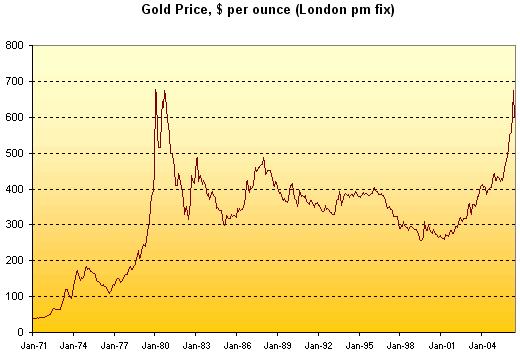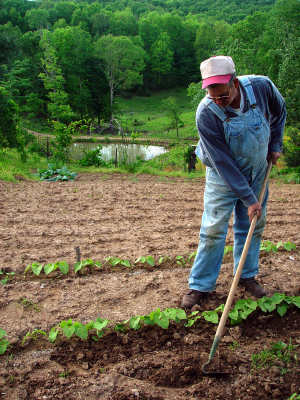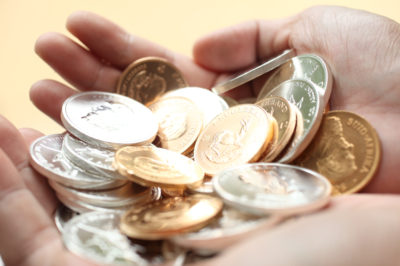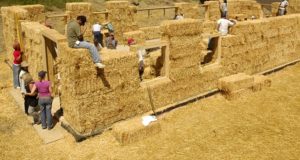The pitchmen filling the TV airwaves with claims that gold is vital to financial independence and survival are leaving out an important piece of the story. Recent history demonstrates that it is entirely possible for any precious metal, including gold, to lose all or most of its value.
Gold is not immune to the market as the TV pitchmen keep claiming. In fact, it is possible for gold to sink to a very low value and stay at that low price for long periods of time. That’s exactly what happened between 1980 and 2004. The thirty-year gold chart below shows what the markets can do to precious metals.

Gold, as you can see, rose to its highest price in 1980 at around $680 an ounce; it did not return to that price again until 2005, around 25 years later. Instead of retaining value, gold actually dramatically lost more than half of its value by 1984 and dropped to even lower prices between 1998 and 2002.
This ugly picture gets worse when you figure in the rate of inflation over that time. The combined rate of inflation for the years between 1980 and 2001 was 114.8%. That means gold was worth even less because the price reported in 2001 when gold prices hit their lowest was calculated in 2001 dollars. The price of gold in 2001 when it was around $300 an ounce was $139.66 in 1980 dollars. Those who don’t believe me should take a look at the inflation calculator.
The math and recent history demonstrate that gold is not a protection against inflation or other market forces. In 2000, a person that put $1,000 in paper money under the mattress in 1980 would have been better off than somebody who had purchased $1,000 in gold coins in 1980.
Not a Good Strategy for Economic Survival
Placing all or a large portion of your family’s funds in gold or other precious metals is not a good strategy for economic survival. These metals don’t protect funds from market forces, and they don’t provide liquidity. Liquidity is the most important thing when it comes to a financial asset; a liquid asset is one you can take out and spend or move quickly.
Other precious metals are actually more vulnerable to the market than gold. Silver, for example, remained at a price of around $9 an ounce between 1985 and 2003. That means silver lost value during that period because of inflation. Platinum’s price fell by nearly $1,400 an ounce during the Great Financial Meltdown of 2008. It hasn’t recovered that price since.
So a family that expects to be immune from market forces because it owns gold will be sadly mistaken. That family will be hurt just as badly by economic downturns as its neighbors that own stocks and bonds.
New book reveals how to keep this “gangster” economy from murdering your money…
Now, many of you are probably saying, okay, so gold and silver are a lousy investment, but shouldn’t I keep a small stash of gold or silver coins for an emergency? The answer is no because there are other cheaper items that can serve as a substitute for money in an emergency. These items are trade goods that can be sold or bartered in an emergency.
Alternatives to Gold
If things get really bad and people resort to barter, there are a lot of things that will be worth more than gold or gold coins. You can purchase most of those items fairly cheaply right now and store some of them indefinitely. Generally, items that people can use will be worth more in a non-money situation.
Here are some items that you can purchase cheaply, which might be worth more than gold in a true emergency:
- Cigarettes and tobacco. Smokers have to have their fix no matter what, and they will pay for it. Cigarettes actually served as currency in Europe right after World War II when the economy had collapsed. Cigarettes are small, and they are easy to stash.
- Wine and liquor. A good wine cellar or a few cases of good Scotch in the basement might be a better investment. If civilization survives, you can drink it. If it collapses, well, people will still want to drink, and they’ll pay or trade for it.

- Seeds, particularly non-GMO and non-hybrid vegetable seeds. People will need to eat and feed their families. Seeds might be one of the most valuable commodities, especially if people experience a few months of hunger or bare supermarket shelves. Right now you can order large amounts of non-GMO and non-hybrid heirloom seeds online for a fairly low price.
- Guns and ammunition. Most people won’t stock up on these until it’s too late. If recent mass shootings cause restrictions on the amount of ammunition that can be sold, it might become difficult to get bullets at some point. Then ammunition, particularly hunting ammo, will be worth a lot.
- Basic hand tools, such as knives, hammers, drills, shovels, screwdrivers, rakes, axes, and saws
- Chainsaws and chainsaw chains
- Firewood. Something you might store up anyway.
- Coal and charcoal for heat and cooking
- Propane, particularly in bottles for barbecues. It might be the only way some people can cook.
- Candles
- Batteries of all shapes and sizes
- Sterno (canned heat)
- Gasoline and diesel fuel
- Generators and parts for generators
- Entertainment on tapes or discs in case the Internet and broadcasting go down. CDs, DVDs, LPS, and VHS tapes containing popular movies, songs, TV shows, and video games might be worth their weight in gold, especially if people have generators and no TV or Internet.
- Books, magazines, and comic books. People will still need something to do. You can buy old paperbacks at thrift stores for less than a dollar a piece.
- Textbooks, how to books, and instruction manuals. A copy of a basic gardening book might be worth $100 or more if the supermarket shelves are bare.
- Food, particularly preserved food. People will need to eat, and they are willing to pay for the privilege.
- Bicycles and bicycle parts. If there is no gasoline, people will still need to get around, and most people won’t be using horses. You can buy old bicycles for less than $20 at thrift stores. Hint: When people need transportation, basic commuter bicycles will outsell mountain bikes or ten speeds. Bicycle carts will be particularly valuable.
- Personal hygiene items, soap, deodorant, razors, shaving cream, shampoo, etc. This stuff has a long shelf life, and people will still want to be clean after the collapse.
- Perfumes and colognes because people will want to smell good.
- Bleach, which can be used to disinfect water
- Bottled water
- Soda pop, candy, and snack foods because people will still want junk food
- Fishing poles and fishing tackle
- Disposable diapers
- Toys
Finally, the best assets you and your family can have are skills that people will pay for. The ability to grow a garden, gather greens from the forest, hunt, fish, repair an engine, cut firewood, repair a gun, fire a gun, repair a bicycle, bake bread, and cook meals from scratch will be worth more than gold. Skills are something that cannot be stolen from you. You can make additional money teaching those skills to those who didn’t bother to learn before the emergency.
A Better Economic Survival Strategy
A better basic strategy will be to keep the family funds in savings accounts, CDs, money markets, and other bank accounts. The bank accounts are FDIC (CDIC in Canada) insured, which means the federal government will replace the money if the bank collapses. More importantly, it is possible to get cash out of the accounts quickly in an emergency.
Almost all banks will give you a debit card for money markets, CDs, and savings accounts. That means you can use the card to make purchases in an emergency or to simply get cash from an ATM. This provides flexibility because it gives a family ready money that it can use to pay bills or cover emergency expenses as well as the ability to pull the funds out quickly.
You won’t be able to pay the phone bill or buy groceries from Costco with gold coins. You will be able to pay the phone bill and make purchases at Costco with a debit card.
Something to remember is that you can use the debit card or the cash to buy up items you can barter quickly in an emergency. You can also slowly build up a stash of “trade goods” over the years. If you do horde such goods, make sure that you buy stuff that has a long shelf life and that you will use or sell quickly in the near future. A perfect example of this is wine, whiskey, and bulk foods.
Stockpiling trade items is a good strategy because those items are not worth that much right now. Nobody’s going to break into your home to steal twenty boxes of disposable diapers or a case of fishing line. They will break in to snatch gold, which is very valuable right now.
Keeping most of your money in cash in insured bank accounts and accumulating a stash of trade goods is a better survival strategy than owning gold. It will give you the flexibility to survive financial crises and the ability to thrive after a large scale collapse.
 Off The Grid News Better Ideas For Off The Grid Living
Off The Grid News Better Ideas For Off The Grid Living






